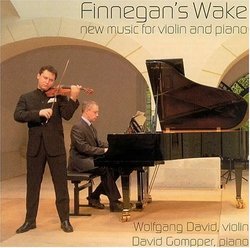Strong Program, Superb Performances
J Scott Morrison | Middlebury VT, USA | 10/13/2004
(5 out of 5 stars)
"As I said recently in a review here, I had realized after I reviewed the wonderful new Naxos release of Ives's violin sonatas by Curt Thompson, violin, and Rodney Waters, piano (ASIN B00008MLVJ) that I didn't know a lot about American violin and piano music. This CD helps to make up for that lack. It is an exceedingly strong program played superbly by a duo new to me: Wolfgang David, violin and David Gompper, piano. David is a young Viennese making his way as a solo violinist; Gompper is a pianist and composer currently on the faculty at the University of Iowa. These performances were recorded in early 2003 at the Gnessin Academy in Moscow while Gompper was a Fulbright Scholar there. Much of the music has been recorded before, but these performances do not give anything away in terms of technical brilliance or musicality.
The program opens with the much-performed, -recorded and -loved Copland Violin Sonata. A War sonata in three movements, it was written in 1943 in memory of a friend of Copland's who had died in the South Pacific. It is in Copland's spare, triadic style and is played with the serenity or brio as needed. Elliott Carter's 'Riconoscenza per Goffredo Petrassi' for solo violin (1984) was written in honor of Petrassi, an Italian composer who had long been a friend of Carter's. It is virtuosic in the extreme (and brilliantly played here by David) in an atonal but not forbidding style. It has been recorded by such new-music luminaries as Irvine Arditti and Rolf Schulte, and I have not heard those performances, but I was completely won over by David's playing of it here. According to the excellent booklet notes by University of Iowa musicology professor, Gregory Marion, the piece is constructed according to a deeply thought-out form. I listened with none of that in mind and was impressed by it simply as music qua music. If you like, say, Copland's 'Piano Variations' or Carter's 'Night Fantasies,' you'll like this.
'Passions' by Ching-Chu Hu (b. 1961 in Iowa City) is a ten-minute atmospheric elaboration of Chinese folk music Hu heard as a child. The violin plays alone for much of the beginning of the piece and imitates Chinese instruments like the erhu and sheng (two-string fiddle and a wind instrument of bamboo pipes respectively); later the piano provides mostly pentatonic accompaniment and echoic effects. Jeremy Dale Roberts (b. England 1934) is represented by the eleven-minute 'Capriccio for Violin and Piano' (1965), reportedly written as a modern equivalent of Paganini's violin solo caprices. It is hard for me to hear that connection except for the form of the piece. The musical substance is, to my ear, 1960s academic modernism of little immediate appeal, although one must say that the performance is committed and virtuosic.
The pièce de résistance (after the Carter) for me is Morton Feldman's 'Spring for Chosroes for Violin and Piano' (1977). It was written for Paul Zukovsky and has been recorded by him with Ursula Oppens, piano, in a scintillating account also available here at Amazon. I have heard that performance and again have to say that I don't think David and Gompper have any reason to feel inferior to their better-known colleagues in this piece. The piece is a 14-minute description, if you can call it that, of the meticulously laid out garden depicted on a carpet woven for the 3rd-century Persian (or Sassanid) ruler, Chosroes. In Feldman's idiosyncratic sound world, tiny aural events represent birds, streams, trees, flowers in a truly evocative way. This is quintessential Feldman and is relatively brief for him; thus it might be a helpful introduction to the music of this American master whose music is coming to be more and more widely admired.
The CD concludes with an 8-minute workout written for violin and piano by our pianist, David Gompper, called 'Finnegan's Wake.' It is, according to the composer (and I know no better way to describe it) as 'Irish-Appalachia-Texas fiddle music embedded within the context of art music.' It is a riot of foot-stomping rhythms and dance tunes transmogrified by complex meter changes and harmonic twists. My only complaint about this otherwise fabulous performance is that its raucous beginning comes after much too short a pause following the pianississimo ending of the Feldman. What a shock! Still it's a wonderful ending for this remarkably meaty and invigorating program.
This is an extremely worthwhile issue for anyone the least bit interesting in this corner of the modern violin and piano repertoire.
TT=70:06
Scott Morrison"

